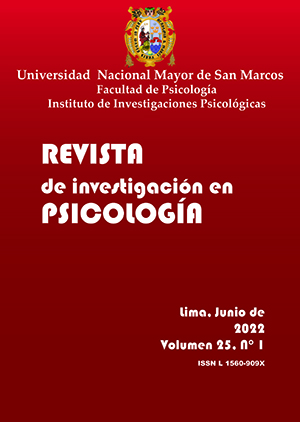Diferencias evolutivas en las funciones neuropsicológicas ejecutivas en niños procedentes de Lima y Ayacucho
DOI:
https://doi.org/10.15381/rinvp.v25i1.20207Palabras clave:
Diferencias evolutivas, funciones neuropsicológicas ejecutivas, memoria de trabajoResumen
El estudio de las funciones ejecutivas es un tema que concita el interés de los investigadores en neuropsicología y neurociencia. En particular, los aspectos evolutivos de dichas funciones neuropsicológicas, en el afán de poder identificar la forma en que dichas funciones van apareciendo en el niño y cómo se van perfilando en la adolescencia, es un tema en exploración. La investigación presente buscó determinar si existían diferencias en la evolución de las funciones ejecutivas en niños diferenciados en grupos de edad: 6-7 años, 8-9 años, 10-12 años. Para ello se empleó la batería de funciones ejecutivas BANFE 2, de Flores et al. (2014). Se trata de una investigación básica con un diseño descriptivo comparativo. Los resultados mostraron diferencias significativas en memoria de trabajo y funciones ejecutivas según rango de edad. Ello se aprecia particularmente en las funciones de memoria de trabajo visoespacial, planeación, flexibilidad mental, fluidez verbal y planeación secuencial y formulación de estrategias. En el conjunto de las funciones neuropsicológicas ejecutivas examinadas, fueron los estudiantes del grupo etario de 10 a 12 años los que obtuvieron las mayores puntuaciones. No se encontraron diferencias estadísticamente significativas al comparar el rendimiento en memoria de trabajo y funciones ejecutivas de los alumnos, de acuerdo con su procedencia, sea de Lima o de Ayacucho.
Descargas
Publicado
Número
Sección
Licencia
Derechos de autor 2022 Ricardo C. Canales Gabriel, Esther M. Velarde Consoli

Esta obra está bajo una licencia internacional Creative Commons Atribución 4.0.
LOS AUTORES RETIENEN SUS DERECHOS:
a. Los autores retienen sus derechos de marca y patente, y tambien sobre cualquier proceso o procedimiento descrito en el artículo.
b. Los autores retienen el derecho de compartir, copiar, distribuir, ejecutar y comunicar públicamente el articulo publicado en la Revista de Investigación en Psicología (por ejemplo, colocarlo en un repositorio institucional o publicarlo en un libro), con un reconocimiento de su publicación inicial en la Revista de Investigación en Psicología.
c. Los autores retienen el derecho a hacer una posterior publicación de su trabajo, de utilizar el artículo o cualquier parte de aquel (por ejemplo: una compilación de sus trabajos, notas para conferencias, tesis, o para un libro), siempre que indiquen la fuente de publicación (autores del trabajo, revista, volumen, numero y fecha).






